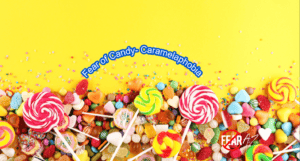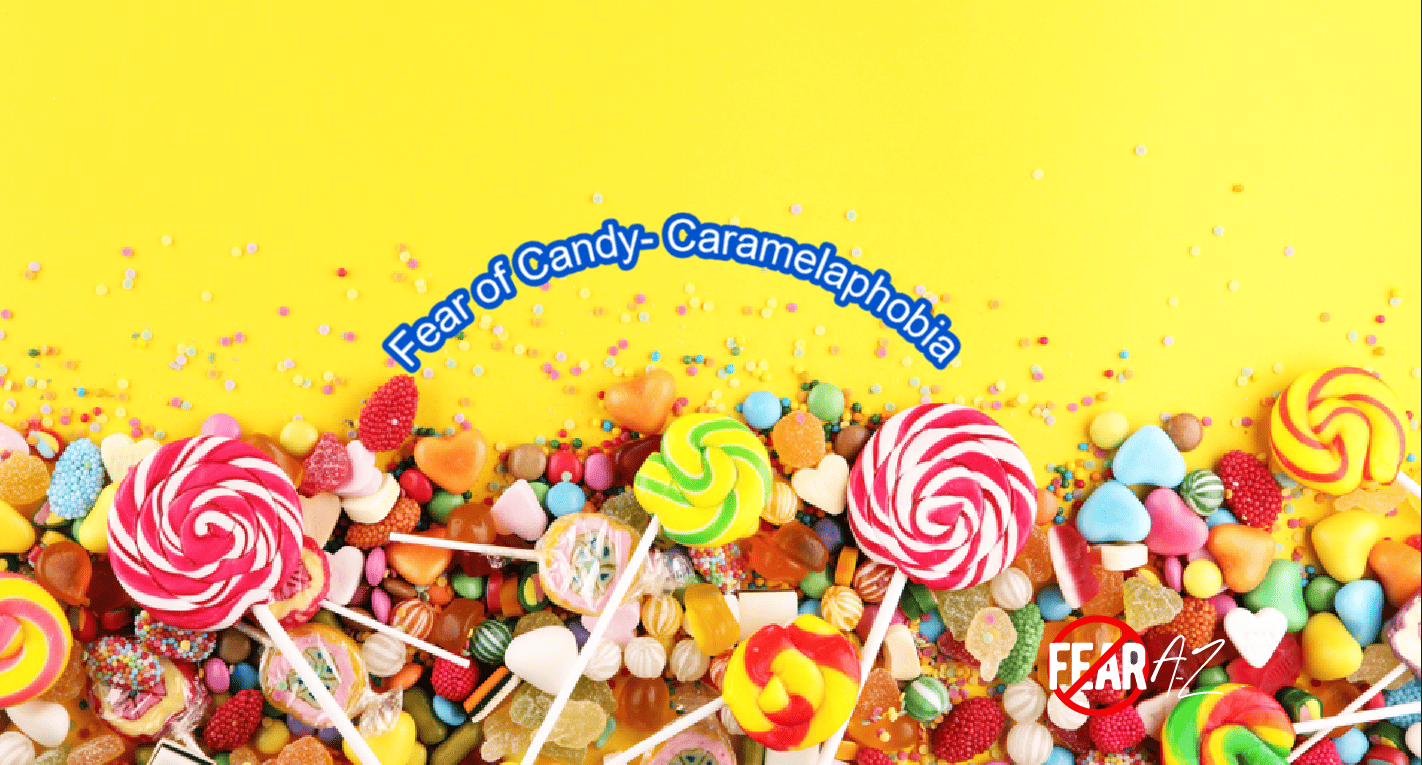Share This Article
Caramelaphobia-Cibophobia: The Not-So-Sweet Fear of Candy
A fear or dislike of candy, specifically caramel, famous sweets made by heating sugar or by other methods, is called caramelaphobia–cibophobia. Even though it’s not considered a real fear in clinical psychology, the idea is an interesting way to explore unusual and specific food dislikes or allergies which may develop into a fear. People who say they have caramelaphobia-cibophobia may feel uncomfortable, anxious, or even panicked when they are near caramel candy or things related to candy.

Symptoms of Caramelaphobia-Cibophobia
Caramelaphobia-cibophobia, may not typically manifest with physical, mental, or emotional symptoms, because it is not recognized as a clinical phobia. However, individuals who strongly dislike or fear caramel candy may experience some physical or mental reactions in response to their aversion. These reactions could include:
Physical Symptoms of Caramelaphobia-Cibophobia
- Nausea: The sight or smell of caramel candy may induce feelings of queasiness in some individuals.
- Loss of Appetite: Strong aversion to caramel may lead to a temporary loss of appetite.
- Gagging: The thought of consuming caramel candy might trigger a physical gag reflex.
- Sweating: In some cases, anxiety or discomfort related to caramel could cause sweating.
- Trembling: Individuals with a strong aversion may experience physical tremors or shivering when confronted with triggers.
- Increased Heart Rate: Anxiety or aversion can lead to an elevated heart rate in some instances.
- Muscle Tension: Tense muscles, particularly in the neck and shoulders, may result from the stress associated with facing caramel candy.
- Dry Mouth: Anxiety or aversion can sometimes lead to a dry or parched mouth.
- Breathing Changes: Rapid or shallow breathing could occur in response to stress or aversion.
- Digestive Discomfort: Gastrointestinal symptoms, such as stomach discomfort or diarrhea, may occur due to the emotional response to caramel candy.
Mental/Emotional Symptoms of Caramelaphobia-Cibophobia
- Anxiety: The thought of encountering caramel can induce feelings of apprehension or unease.
- Disgust: Individuals with caramelaphobia may feel disgusted or repelled by caramel or caramel-flavored items.
- Irritation: Seeing or smelling caramel may lead to irritability or annoyance.
- Avoidance Behavior: Those with this aversion might go to great lengths to avoid caramel, even in social or dining situations.
- Negative Thoughts: Negative or catastrophic thoughts about caramel candy can persist, causing distress.
- Overthinking: Over-analyzing the presence of caramel in various situations may be a common response.
- Nausea: The mere thought of consuming caramel can lead to feelings of nausea.
- Discomfort: Mental or emotional discomfort may arise in situations where caramel candy is present.
- Increased Stress: Encountering caramel in any form may lead to heightened stress or anxiety levels.
- Rejection Anxiety: Individuals may fear being forced to consume caramel or being pressured to do so, which can induce anxiety or panic.
Caramelaphobia-cibophobia is not a recognized psychological condition, and these responses may vary from person to person based on their individual preferences and aversions.
Possible Causes for Caramelaphobia-Cibophobia
Caramelaphobia-cibophobia, or fear or aversion to caramel candy, can have various potential causes. These may include:
Negative Past Experience
A traumatic or negative experience related to caramel candy, such as choking on it, can lead to an aversion or fear.
Texture Aversion
Some individuals may dislike the gooey or sticky texture of caramel, which can contribute to their aversion.
Taste Preferences
Personal taste preferences play a significant role. Some people may have an aversion to the sweet, sugary taste of caramel candy.
Sensory Sensitivity
Individuals with heightened sensitivity to tastes and textures may find the sweetness and stickiness of caramel overwhelming.
Cultural Factors
Cultural backgrounds can influence food preferences and aversions. In some cultures, caramel may not be commonly consumed.
Mental/Emotional Associations
Caramelaphobia-cibophobia can be linked to both mental and emotional associations, where an individual connects caramel with negative emotions or experiences.
Parental Influence
Early childhood experiences and parental preferences can influence an individual’s attitude toward caramel.
Peer Pressure
Social pressure or teasing from peers or family members can lead to aversions or phobias related to specific foods, including caramel candy.
Imaginative Fears
In some cases, imaginative fears or irrational thoughts about caramel candy can develop without any concrete basis.
Unknown Origin
Occasionally, aversions or phobias may emerge without a clear or identifiable cause.
Remember, caramelaphobia-cibophobia are not true mental or medical diseases. Instead, they’re often used in a lighthearted way to mean that someone doesn’t like caramel candy. The reasons for this dislike may be different for each person.
Possible Treatments for Caramelaphobia-Cibophobia
Here are some self-help and professional options for those looking to overcome their aversion to caramel. Treatment option chosen should be based on the severity of your phobia.
Self-Help Options for Fear of Caramel Candy
Here are some self-help options for those looking to overcome their aversion to caramel:
Gradual Exposure
Gradual exposure to caramel candy in controlled and safe settings can help desensitize your aversion. Start with small, manageable steps, like looking at caramel, then progressing to touching it, and eventually tasting it.
Positive Visualization
Visualize positive and pleasant associations with caramel. Imagine enjoying this product in a pleasant context, which can help shift your perception.
Education
Learn more about caramel candy, its ingredients, and the various ways it can be enjoyed. Understanding the food better can reduce aversion.
Caramel in Moderation
Gradually incorporate small amounts of caramel into your diet, mixing it with other foods or desserts you enjoy.
Mindfulness Techniques
Practice mindfulness to stay present in the moment and reduce overthinking or anxiety when encountering caramel.
Relaxation Strategies
Engage in relaxation techniques like deep breathing, progressive muscle relaxation, or meditation to manage anxiety or discomfort.
Positive Affirmations
Use positive affirmations to challenge and replace negative thoughts about caramel candy with more positive beliefs.
Support System
Talk to friends or family about your aversion and seek their understanding and encouragement as you work on overcoming it.
Professional Help Options for Caramelaphobia-Cibophobia
Counseling or Therapy
Consult with a mental health professional, such as a psychologist or therapist, who specializes in specific phobias or food aversions. They can provide you with techniques to address your aversion to caramel.
Cognitive-Behavioral Therapy (CBT)
CBT is an evidence-based approach for treating phobias. A therapist can help you identify and challenge negative thought patterns and behaviors related to your aversion to caramel.
Exposure Therapy
Exposure therapy involves gradual and controlled exposure to the source of your fear, in this case, caramel candy. A therapist can guide you through this process, helping you confront your aversion.
Relaxation Techniques
A therapist can teach you relaxation techniques to manage anxiety and distress when encountering triggers.
Hypnotherapy
Hypnotherapy can address the underlying causes of your aversion to caramel candy and help you develop a more positive association with it.
Support Groups
Participating in support groups led by mental health professionals can provide a sense of community and shared understanding. It can be especially helpful if others are also working to overcome similar aversions.
Nutritional Counseling
In some cases, aversions to specific foods may be related to underlying nutritional issues or sensory sensitivities. A nutritionist or dietitian can offer guidance and support.
Medication
In rare cases, when the fear is associated with severe anxiety or panic attacks, medication may be prescribed. This is typically used in conjunction with therapy and is aimed at reducing anxiety symptoms.
Living with Caramelaphobia-Cibophobia
If you have caramelaphobia-cibophobia, which is a dislike or fear of caramel candy, everyday life may be hard in some ways. Seeing candy in different forms, like in desserts or treats, can leave you feeling anxious and uncomfortable. When caramel is involved, social settings can be especially stressful because other people might not understand the dislike. People who have caramelaphobia-cibophobia might avoid certain events, or even meetings, which limits their experiences. The fear or dislike can cause you to feel alone or upset. To overcome caramelaphobia-cibophobia, you need time, support, and maybe even professional guidance. The goal is to gradually lessen the worry that comes with caramel candy, which will make your life more comfortable, satisfying, and yes, sweet.



